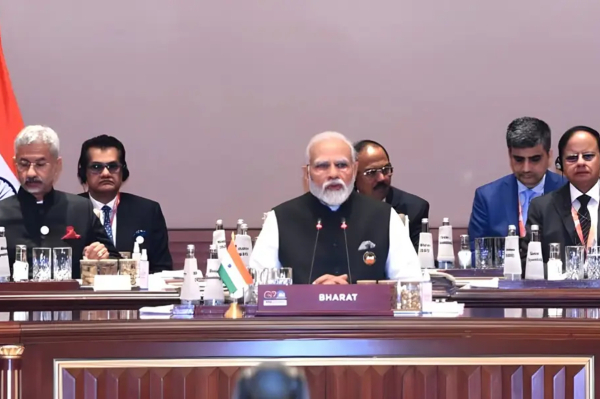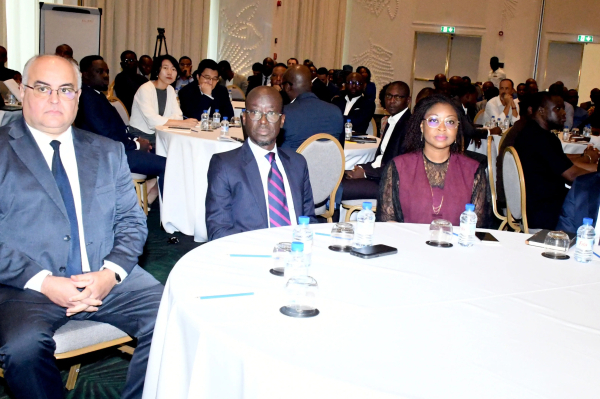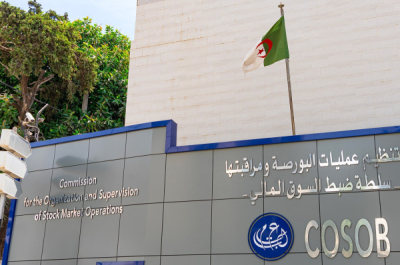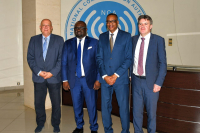
Public Management (603)
-
India signed cooperation agreements with 23 countries, including six African states, on digital public infrastructure.
-
The partnership gives African governments access to 18 Indian digital platforms through India Stack Global.
-
A World Economic Forum study warned about cybersecurity and data privacy risks linked to large-scale DPI systems.
The Indian government announced on Friday, February 6, the signing of memoranda of understanding with 23 countries, including six African nations, to cooperate on digital public infrastructure (DPI). The agreements cover collaboration on digital identity, digital payments, data exchange, and public service delivery platforms.
The African countries involved include Sierra Leone, Tanzania, Kenya, Ethiopia, Gambia, and Lesotho. These states can replicate or adopt Indian digital governance platforms through India Stack Global, a portal that showcases India’s DPI solutions and facilitates their deployment in partner countries. The portal provides access to 18 core digital platforms.
These platforms include Aadhaar, a biometric digital identity system; the Unified Payments Interface (UPI), a real-time digital payments system; DigiLocker, a digital wallet for authenticated documents; e-Hospital, an online hospital management system; e-Office, a paperless governance platform; eCourts, which digitizes judicial procedures; and DIKSHA, a national digital learning platform.
The remaining solutions cover vaccination management, secure data sharing, digital health, public procurement, online administrative services, telemedicine, non-communicable disease monitoring, nutrition services, training and employment, public finance management, and infrastructure planning.
This initiative emerges as African countries increasingly view digital transformation as a driver of socio-economic development. Governments see DPI as a structural tool to improve public sector efficiency, strengthen financial inclusion, and expand access to essential services. In this field, India positions itself as a global reference, as its platforms serve about 1.3 billion people and attract growing international interest. UPI already operates in the United Arab Emirates, Singapore, Bhutan, Nepal, Sri Lanka, France, Mauritius, and Qatar.
India ranked 97th globally in the United Nations E-Government Development Index (EGDI) 2024, with a score of 0.6678 out of 1. The country ranked above the global average of 0.6382 and well above Africa’s average of 0.4247. In the Online Services sub-index, India recorded a score of 0.8184 out of 1, compared with a global average of 0.5754.
Systemic Risks Not to Be Underestimated
Growing interest in the digital public infrastructure model also raises concerns, particularly around cybersecurity. In a study published in October 2025, the World Economic Forum stated that as governments worldwide, especially in the Global South, seek to replicate similar architectures, the central challenge now concerns secure design rather than basic deployment.
The study highlighted several vulnerabilities observed in India. Public exposure of personal information belonging to officials triggered a large-scale data breach that affected more than 20 million citizens. The system also faced manipulation attempts using forged biometric media, while correlation attacks showed that linking Aadhaar to multiple public services could generate cascading privacy risks.
As cyber threats targeting critical infrastructure expand, the World Economic Forum assessed that securing digital public infrastructure has become essential. Even a potential cyberattack can undermine system integrity and availability while eroding public trust. The main identified risks include synthetic identity fraud, algorithmic bias, artificial intelligence–driven cyber threats, and data sovereignty challenges.
Isaac K. Kassouwi
-
Benin launched consultations to draft a national digital strategy covering the period through 2031.
-
Authorities prioritized nationwide internet coverage, e-government expansion, and artificial intelligence development.
-
The strategy builds on reforms since 2016 that expanded fiber infrastructure and digital public services.
Benin launched a policy design process to develop its Digital Strategy through 2031. Key public and private sector stakeholders met in Cotonou on February 5, and Friday, February 6, during a strategic workshop that formally initiated work on the medium-term digital policy roadmap.
Participants focused discussions on several priorities. Stakeholders examined the expansion of internet coverage across the entire territory. Participants also assessed public service modernization through e-services and reviewed the deployment of emerging technologies, including artificial intelligence, in high-potential sectors. In addition, participants analyzed the alignment between local digital skills and labor market needs, as well as financing mechanisms required to implement the future strategy.
Authorities anchored the new roadmap in reforms launched since 2016. These reforms enabled the deployment of more than 3,000 kilometers of fiber-optic infrastructure. The reforms also improved nationwide connectivity, established the National Register of Natural Persons, and launched more than 250 digital public services. These advances positioned Benin among Africa’s top performers in the 2025 GovTech Maturity Index, alongside Algeria, South Africa, and Nigeria.
Despite this progress, authorities still face several challenges. Gaps in internet access persist in some areas. Limited adoption of digital services by parts of the population remains a constraint. The economy also requires deeper integration of artificial intelligence technologies. Through the forthcoming strategy, authorities aim to consolidate reforms, accelerate digital inclusion, and turn the digital sector into a sustainable engine of economic growth and structural transformation by 2031.
This article was initially published in French by Samira Njoya
Adapted in English by Ange J.A de BERRY QUENUM
-
Chad mandated Techso Group to secure and certify its national data center before launch.
-
Authorities linked the project to cybersecurity risks and the “Chad Connection 2030” strategy.
-
International rankings continue to place Chad among the weakest performers in cybersecurity and e-government.
Chadian authorities assigned Techso Group the task of securing the national data center ahead of its launch. A tripartite agreement was signed on February 5, between the company, the Agency for ICT Development (ADETIC) and the National Agency for Information Security and Electronic Certification (ANSICE).
The partnership covers a security audit and the certification of the site and its equipment to ensure compliance with current standards for critical infrastructure protection. “This aims to guarantee the reliability, integrity and resilience of the national data center,” said Nadjma Saleh Kebzabo, deputy director general of ANSICE.
The agreement also provides for the operational deployment of 100 micro data centers across government institutions. “Interconnected with the national data center, these systems will establish a unified, secure and high-performance digital architecture to support the dematerialization of administrative procedures and improve public service quality,” ADETIC said in a statement.
Authorities launched the initiative amid what they described as “growing challenges related to cybercrime and the protection of sensitive data.” Digital transformation continues to accelerate across Africa as governments integrate information and communication technologies to support socio-economic development. Chad, for example, places digital technology at the core of its national development plan known as “Chad Connection 2030.”
The plan includes $1.5 billion in digital investments. Authorities aim to position the country among Africa’s leading digital economies and significantly expand network coverage to connect most of the population. The program also targets the digitization and interconnection of all public and para-public services to provide full access to e-government services. Authorities also list digital inclusion among their priorities.
However, the International Telecommunication Union said cybersecurity remains a prerequisite for countries seeking to fully leverage ICT opportunities for development. The organization ranked Chad in the second-lowest category, Tier 4, in its 2024 Global Cybersecurity Index. Chad recorded relatively strong results in regulatory frameworks and cooperation but must intensify efforts in technical measures, organizational capacity and skills development.
For now, Chad ranks 189th out of 193 countries in the United Nations E-Government Development Index, with a score of 0.1785 out of 1. The country remains below the African average of 0.4247 and the global average of 0.6382.
This article was initially published in French by Isaac K. Kassouwi
Adapted in English by Ange J.A de BERRY QUENUM
- Database offers 11,000 hours across 21 languages, open access
- Project aims to boost voice AI and preserve African languages
Google said on Monday, Feb. 2, it had launched WAXAL, a voice database aimed at supporting the development of AI tools tailored to Sub-Saharan Africa. The dataset covers 21 languages, including Yoruba, Acholi, Hausa, Luganda, Malagasy and Shona, and contains more than 11,000 hours of audio from nearly 2 million recordings.
“We wanted to capture how people really talk, so we asked participants to describe different pictures in their native languages. We also recorded professional voice actors in the studio to create the high-quality audio needed for text-to-speech technology,” Google said, adding that professional voice actors were also recorded in studios to provide high-quality material for text-to-speech systems.
The company said WAXAL includes 1,250 hours of transcribed speech for automatic speech recognition and more than 20 hours of studio audio for text-to-speech synthesis. The project was developed with African partners including Makerere University in Uganda, the University of Ghana and Digital Umuganda in Rwanda.
WAXAL is available under an open licence on the Hugging Face platform, giving researchers and developers free access. Google said the initiative aims to spur innovation in voice technology and help safeguard African languages online.
UNESCO estimates Africa is home to between 1,500 and 3,000 languages, but most digital tools support only a handful. Limited high-quality data has slowed the development of voice assistants, educational apps and automated transcription on the continent.
Several local initiatives are also working to address the shortage. In Benin, the “JaimeMaLangue” project encourages citizens to help build a national voice database. Other datasets, such as African Voices in Nigeria and African Next Voices in Mali, are expanding resources for underrepresented languages.
Samira Njoya
- Algeria exempts certified startups from IPO and listing fees on the Algiers Stock Exchange until 2028, targeting fundraising up to 500 million dinars ($3.85 million).
- The measure applies to the “Croissance” segment, designed for high-potential companies, and aims to reduce barriers to capital market access for startups.
- Only one Algerian startup, Moustachir, has listed to date, achieving regional expansion and projected revenue growth to 187 million dinars by 2028.
Algeria’s capital market authorities aim to stimulate startup financing by waiving IPO fees for certified startups until 2028. The measure, announced February 1 by the Commission d’Organisation et de Surveillance des Opérations de Bourse (COSOB) in coordination with the Société de Gestion de la Bourse des Valeurs (SGBV) and Algérie Clearing, allows young companies to raise funds without paying listing or administrative costs.
The exemption covers the “Croissance” segment of the Algiers Stock Exchange, a market tier for high-potential companies. Eligible startups avoid fees for document review, listing, administration, securities custody, and management. The initiative applies to fundraising operations capped at 500 million dinars ($3.85 million) and is valid for transactions conducted between 2026 and 2028.
Algeria hosts over 7,800 startups on the official portal startup.dz, with roughly 2,300 certified as official “startups.” Authorities view the fee waiver as a key lever to enhance access to capital markets, a historically limited source of funding for young companies.
The policy complements broader public strategies to support entrepreneurship and innovation as drivers of economic diversification. The Algiers Stock Exchange remains small, listing only eight companies as of mid-2025, including the Banque de Développement Local (BDL) and the startup Moustachir.
Moustachir, the only startup to have listed so far, joined the exchange in 2024. The company projected revenue above 55 million dinars in 2025, with a target exceeding 187 million dinars by 2028. Within two years, it has expanded into Middle Eastern markets, including Oman and the United Arab Emirates.
Samira Njoya
- SABC and Microsoft South Africa launched a program on SABC Plus to provide digital and AI skills training to South Africans.
- Microsoft has already trained 1.4 million people and certified nearly 500,000 citizens under its Microsoft Elevate and AI Skills Initiative programs.
- The initiative targets growing labor market demand, with an estimated 230 million jobs in sub-Saharan Africa requiring digital skills by 2030.
South Africa’s public broadcaster, South African Broadcasting Corporation (SABC), partnered with Microsoft South Africa to provide citizens with training in digital skills and artificial intelligence (AI). The program delivers content via SABC Plus, a free streaming platform with 1.9 million registered users.
Tiara Pathon, Microsoft Elevate AI Skills director in South Africa, said, “AI can be a powerful driver of opportunity. By partnering with SABC, we aim to integrate digital and AI skills into the daily lives of millions of South Africans. This initiative provides learners, teachers, and job seekers with practical, certified pathways that prepare them for the workforce of tomorrow. Democratizing AI skills is not just a goal; it is our responsibility to build a more inclusive digital economy.”
The initiative forms part of Microsoft Elevate, which equips individuals and organizations with the tools to thrive in an AI-driven economy. It builds on the AI Skills Initiative launched in 2025, which committed to training one million South Africans by 2026. To date, Microsoft reports reaching four million learners, training 1.4 million, and issuing certifications to nearly 500,000 citizens.
The program responds to strong labor market demand for digital skills. The World Bank estimates 230 million jobs in sub-Saharan Africa will require digital competencies by 2030. The World Economic Forum’s 2025 Future of Jobs Report ranks AI and data skills among the most in-demand by 2030. LinkedIn reports a 25% year-on-year increase in AI-related hires, with job postings requiring AI skills up 70%, extending beyond technical roles.
According to Microsoft’s AI Diffusion Report, AI adoption in South Africa rose from 19.3% in the first half of 2025 to 21.1% in the second half, a 1.8-point increase. Recruitment platform Pnet notes AI-related job demand in the country grew 352% between January 2019 and July 2025.
Despite the program’s potential, effectiveness remains a concern. Only 25% of SABC Plus’s 1.9 million registered users are active, limiting the initiative’s reach. Free access requires an internet connection, which remains uneven across rural or low-income communities. Citizens lacking digital devices also remain excluded from the training.
This article was initially published in French by Isaac K. Kassouwi
Adapted in English by Ange J.A de BERRY QUENUM
- Gabon adopted a draft ordinance to regulate digital archiving during a cabinet meeting on January 29.
- The framework aims to govern electronic records, public archives, and digital service providers.
- Gabon scores well on cybersecurity legislation but shows major weaknesses in technical capacity.
The Gabonese government now wants to establish a legal framework for digital archiving in the country. The cabinet adopted a draft ordinance on January 29, during a Council of Ministers meeting.
According to the authorities, the initiative fits into the national archiving policy and sets principles and rules for the creation, preservation, management, and use of electronic and digital documents. The framework also regulates companies that provide digitization and electronic archiving services.
The Ministry of Digital Economy said the measure enables the creation, preservation, and security of administrative documents in digital form. The ministry added that the framework improves the organization and protection of state archives. The ministry also said the framework regulates providers that digitize and store electronic records.
This initiative aligns with Gabon’s broader digital transformation agenda. The authorities want to integrate digital technology across all sectors of the economy. The government expects digital archiving to improve efficiency, reduce data loss, and increase transparency, particularly in public administration.
Since July 2025, the government has explored local solutions for electronic document management. The authorities have engaged companies such as CompanyViene and ST Digital. In early December, the government organized a workshop that brought together sector stakeholders. The workshop aimed to lay the foundations for an integrated and secure system to archive judicial records and improve their processing and public access.
However, digital archiving raises security concerns amid rising cyberattacks and cybercrime in Africa. The International Telecommunication Union ranked Gabon among the least advanced countries in cybersecurity in its 2024 Global Security Index. The ITU said Gabon established a favorable legal framework for cybersecurity and awarded the country a maximum score of 20 out of 20 in that category. However, the ITU identified gaps in organization, capacity building, cooperation, and technical measures. The country scored 0 out of 20 in those areas.
This article was initially published in French by Isaac K. Kassouwi
Adapted in English by Ange J.A de BERRY QUENUM
-
Zimbabwe will deploy 8,000 Starlink internet kits to primary and secondary schools nationwide.
-
The government aims to close the digital divide, especially in remote and underserved areas.
-
Authorities already connected 3,500 of the country’s 7,000 schools through international programs.
The Zimbabwean government decided to equip primary and secondary schools with 8,000 Starlink internet kits. Authorities said the initiative seeks to guarantee nationwide connectivity for schools, with a particular focus on remote and poorly served areas.
The Minister of ICT, Postal and Courier Services, Hon. Tatenda Mavetera, today donated 8,000 Starlink internet kits to the Ministry of Primary and Secondary Education under the Presidential Internet Scheme.
— Ministry of ICT, Postal & Courier Services - Zim (@MICTPCS_ZW) January 21, 2026
The consignment was officially received by the Minister of Primary and… pic.twitter.com/GK3CGoJoek
The Ministry of Information and Communication Technologies formally handed over the equipment to the Ministry of Primary and Secondary Education on Wednesday, January 21, 2026. During the ceremony, ICT Minister Tatenda Mavetera said the program aims to reduce the digital divide and provide learners across Zimbabwe with access to affordable and reliable internet services.
In a statement published on X, the Ministry of ICT said that “this initiative should strengthen digital learning, improve access to global educational resources, and prepare students to participate competitively in the digital economy.” The ministry added that the project forms part of government efforts to modernize the education sector and promote inclusive access to information and communication technologies.
Zimbabwe already benefits from the GIGA project, a joint initiative of the International Telecommunication Union and UNICEF, which aims to connect all schools worldwide to the internet. According to official data cited by GIGA in March 2025, 3,500 Zimbabwean schools out of a total of 7,000 already have internet connectivity. The ITU committed to working with national authorities to identify the most efficient and cost-effective connectivity solutions for the remaining schools.
While international institutions, including UNESCO, widely recognize the potential of ICT to improve education systems, the use of Starlink’s satellite technology raises several questions. These concerns include the availability of connection devices in schools such as computers, tablets, or smartphones, the digital skills of teachers, access to electricity, the relevance of digital educational content, and the sustainability of the model, given that Starlink operates on a monthly subscription basis.
This article was initially published in French by Isaac K. Kassouwi
Adapted in English by Ange Jason A. de BERRY QUENUM
-
South Sudan created a national committee to supervise gateway services and data center operations.
-
Internet penetration reached 15.7%, with about 1.9 million users in early 2025.
-
The regulator partnered with Switzerland’s mgi communications ag to modernize governance and revenue flows.
At the beginning of 2025, South Sudan counted about 1.9 million internet subscribers, representing a penetration rate of 15.7%, according to DataReportal. The figures highlighted both rising connectivity and the structural limits of the country’s digital ecosystem.
Against this backdrop, South Sudanese authorities last week officially established a Supervisory Committee for Gateway Services and the National Data Center. The government assigned the committee a mandate to strengthen governance, accountability, and institutional control over these critical infrastructures.
The National Communications Authority (NCA) created the committee with technical support from Swiss firm mgi communications ag (MGI). The regulator tasked the body with digitizing revenue flows from South Sudan’s International Gateway (SSIGW) to improve transparency and efficiency.
At the same time, the committee aims to modernize digital infrastructure to accelerate national digital transformation. Authorities also instructed the committee to ensure that all operations strictly protect national sovereignty and security interests.
Officials view the initiative as a structural step to secure strategic digital infrastructure while laying the foundation for stronger regulatory oversight and long-term sector growth.
This article was initially published in French by Isaac K. Kassouwi
Adapted in English by Ange Jason Quenum
-
Nigeria ranked 144th out of 193 countries in the UN e-government index in 2024 and seeks to accelerate digital reform.
-
Denmark’s cBrain partnered with Nigeria’s Publica AI to deploy the F2 government software platform across federal ministries and agencies.
-
Nigeria aims to digitize 75% of public services by 2027, positioning the country as a key market for digital government in Africa.
Ranked 144th out of 193 countries by the United Nations for e-government in 2024, Nigeria is seeking to modernize its public services. To achieve this goal, the country has expanded international partnerships, while Denmark’s cBrain could play a central role in this transformation.
cBrain, a Danish provider of government software, announced on Wednesday, January 14, a partnership with Nigerian technology solutions provider Publica AI to deploy its F2 platform across Nigeria’s federal ministries and agencies. The standardized solution combines case management, automated workflows, and embedded artificial intelligence, offering a ready-to-use tool designed to accelerate administrative modernization.
Under the agreement, Publica AI will handle implementation and adaptation to Nigeria’s regulatory requirements. “This partnership combines international expertise with local knowledge, ensuring that all sovereign data remains in Nigeria while delivering world-class technology,” said Willie Ignatius, Chief Executive Officer of Publica AI.
cBrain designed its off-the-shelf F2 digital platform specifically for government use. The platform provides core capabilities required for digital government and reduces reliance on custom development and lengthy IT projects. These capabilities include case management, integrated workflows, self-service tools, registries for citizens and businesses, mass-operation functions to manage large case volumes, and on-site embedded artificial intelligence.
The deployment of F2 forms part of cBrain’s broader Africa strategy, which the company has already tested in Kenya. Nigeria’s selection reflects its strategic importance, as the country has more than 200 million people and rising demand for accessible digital public services. The Nigerian government aims to digitize 75% of its public services by 2027.
Beyond administrative efficiency, the partnership seeks to stimulate Nigeria’s digital economy by improving access to public services and strengthening institutional transparency and accountability. The deal also represents a strategic opportunity for cBrain, which plans to expand its African footprint while leveraging international standards to build a model that it can replicate in other countries across the continent.
This article was initially published in French by Samira Njoya
Adapted in English by Ange Jason Quenum
More...
- Kenya’s School of Government is discussing a partnership with Huawei’s local unit to support public-sector digital transformation.
- The talks include a potential memorandum of understanding covering cloud, artificial intelligence, and cybersecurity skills.
- Kenya plans to digitize all public services and deploy 1,450 community digital centers under its 2022–2032 Digital Master Plan.
The Kenya School of Government (KSG), a public institution responsible for strengthening citizens’ skills, is exploring a partnership with the local subsidiary of Chinese technology company Huawei. The potential collaboration aims to support the country’s ongoing digital transformation.
KSG said the discussions focused on leveraging emerging digital technologies to strengthen leadership development, institutional efficiency, and innovation within the public administration. The talks also examined the development of a memorandum of understanding to anchor long-term cooperation on digital capacity building for senior officials, knowledge transfer, and national digital transformation priorities.
“Our objective is to build a public service that is not only digitally literate, but also capable of effectively applying cloud, artificial intelligence, and cybersecurity tools to improve service delivery, strengthen institutional performance, and protect citizens’ data,” said Nura Mohamed, Director General of KSG, as reported by TechTrend.
The initiative aligns with Kenya’s broader digital transformation agenda, which positions information and communication technologies as a pillar of socio-economic development.
Through its Digital Master Plan 2022–2032, Kenya aims to deploy 1,450 community digital centers and digitize all public services. In this context, the Organisation for Economic Co-operation and Development said investment in civil-service skills has become essential, as digital technologies can transform public administration by enabling more accessible and efficient services.
“Achieving digital government, where technology is applied to the design of processes, policies, and services that meet users’ needs, requires the adoption of new ways of working and new skills within public administrations,” the OECD said in its February 2024 report Developing skills for digital government: A review of good practices across OECD governments. “Governments must promote the skills, attitudes, and knowledge that allow civil servants to operate in a digital environment by integrating digital technologies to create public value.”
UNESCO said civil servants should not become technical experts. The organization said public officials should instead understand emerging technology trends and acquire a basic understanding of the societal implications of technology to lead digital transformation and governance initiatives.
UNESCO added that digital planning and design, data use and governance, and digital management and execution represent three essential skill areas that civil servants must master, depending on their country’s digital transformation needs.
This article was initially published in French by Isaac K. Kassouwi
Adapted in English by Ange Jason Quenum
-
Algeria launches the AMLAK system to replace paper land titles with a fully electronic format.
-
Authorities aim to reduce delays, secure property rights, and improve land governance transparency.
-
Rising land activity strengthens the case for digital reform as title issuance increased 15% in 2025.
Algeria has launched the nationwide rollout of the AMLAK information system, which aims to gradually replace the paper-based land title booklet with a fully electronic format. The General Directorate of National Land Domain (DGDN) announced the decision on Sunday, January 11, as part of efforts to accelerate the digital transformation of land administration. Ultimately, authorities will connect all cadastral and land registry offices to this unified system.
The transition to an electronic land title first targets the weaknesses of the current system. Paper-based procedures generate long processing times, create update difficulties, and expose documents to risks of loss or falsification. By centralizing the issuance, modification, and archiving of land titles, the AMLAK system should improve data reliability and strengthen coordination among relevant services.
Unlike a simple digitization process, the system relies on a comprehensive traceability mechanism for all land operations. The platform records each stage, from application submission to title issuance. As a result, operations become verifiable and compliant with existing regulatory requirements. For the administration, AMLAK also provides real-time performance indicators, which facilitate the monitoring of cadastral activity and resource management.
For users, the reform should lead to a significant reduction in processing times. Cadastral and land registry services should process applications more quickly, thereby limiting administrative bottlenecks. This streamlining of procedures could accelerate real estate transactions, secure property rights, and reduce disputes related to land titles, which represent key factors for the proper functioning of the real estate market.
This development occurs amid rising land activity. In 2025, the National Agency for Land Conservation, Cadastre, and Cartography (ANCFCC) issued 430,000 land titles, representing a 15% increase compared with 2024. This momentum increases pressure on land services and strengthens the case for a digital system capable of handling growing volumes of applications.
Over the longer term, the nationwide adoption of AMLAK could improve land governance and strengthen administrative transparency. By relying on centralized and updated land data, the state acquires a tool capable of supporting real estate investment security and modernizing the management of national land assets.
This article was initially published in French by Samira Njoya
Adapted in English by Ange Jason Quenum
- Senegal adopts a draft law to replace the CNRA with a new National Media Regulation Council.
- The reform extends regulation to digital platforms and online content creators.
- The government aims to curb disinformation while preserving freedom of expression.
New media platforms, including social networks, blogs, and video-sharing sites, now dominate information consumption among young people in Africa and elsewhere.
Governments face rising challenges from disinformation, hate speech, and other abuses on digital channels that regulators previously overlooked.
Against this backdrop, regulation has become an urgent priority.
At a cabinet meeting held on Wednesday, January 7, 2026, the Senegalese government adopted a draft law establishing the National Media Regulation Council, known by its French acronym CNRM.
The new institution will replace the National Audiovisual Regulation Council, or CNRA, which the government created in 2006.
This reform marks a major overhaul of the legal framework to address digital transformation and evolving information practices.
According to Minister of Communication, Telecommunications, and Digital Affairs Alioune Sall, the reform aims to “adapt regulation to technological change, protect rights, strengthen accountability among stakeholders, and consolidate democracy.”
The minister said the legal framework will align “with international best practices in media and digital communication regulation, while taking into account recommendations from regional and international bodies.”
Over the past two decades, digitalization, the rise of social platforms, and the growth of independent content creators have transformed Africa’s media landscape, particularly in Senegal.
The reform seeks to extend regulation to a hybrid public space where traditional and digital media increasingly overlap.
Under the new framework, the CNRM will supervise digital platforms and content creators who disseminate information to the public.
This approach aligns with a global trend in which governments attempt to balance the protection of freedoms with digital accountability.
States increasingly target fake news and online opinion manipulation while preserving democratic principles.
“When they participate in the public information space, they must comply with principles of responsibility, just like traditional media,” said Habibou Dia, director of communication at the Ministry of Communication, Telecommunications, and Digital Affairs.
The policy aims to establish a level regulatory playing field, promote shared ethical standards, and combat disinformation while safeguarding freedom of expression.
The cabinet’s adoption of the draft law represents an initial step in the legislative process.
The government will soon submit the bill to the National Assembly for review and final approval.
Implementation of the law would mark Senegal’s transition to a new phase of media regulation based on an integrated and digital-economy-oriented model.
-
Initial phase targets vehicle overloading and seatbelt non-compliance
-
Authorities say broader coverage needed to assess road safety impact
Mauritanian authorities have deployed an artificial intelligence-powered system to automatically detect and record traffic violations nationwide in real time, according to the government. The initiative has been operational since December 25 and is part of efforts to integrate digital technology into road safety management.
The system’s first phase focuses on two main violations: vehicle overloading, detected automatically when a vehicle exceeds its authorized weight, and failure to wear a seatbelt, detected by smart cameras. The solution aims to modernize monitoring through automatic alerts and improved data tracking, particularly during intercity travel.
The use of digital technology for road safety in Mauritania remains at an early stage, however. Expanding the system to cover a wider range of violations will be necessary to assess its real impact on road safety.
AI’s potential extends beyond detecting violations. The International Telecommunication Union (ITU), for example, launched the “AI for Road Safety” initiative in 2021, promoting a “safe system” approach built around six pillars: road safety management, safer roads and mobility, safer vehicles, safer road users, post-crash response, and speed control.
According to the UN agency, AI can improve the collection and analysis of crash data, generate insights to prevent collisions, and optimize post-crash response, helping to strengthen regulatory frameworks.
The ITU cautions, however, that AI is not a cure-all. Adequate safety standards, rigorous system testing, and safeguards against risks to human rights and privacy are essential to ensure these technologies are used reliably, securely, and ethically. Developing robust telecommunications infrastructure, such as 5G, will also be necessary to support such systems.
Isaac K. Kassouwi















